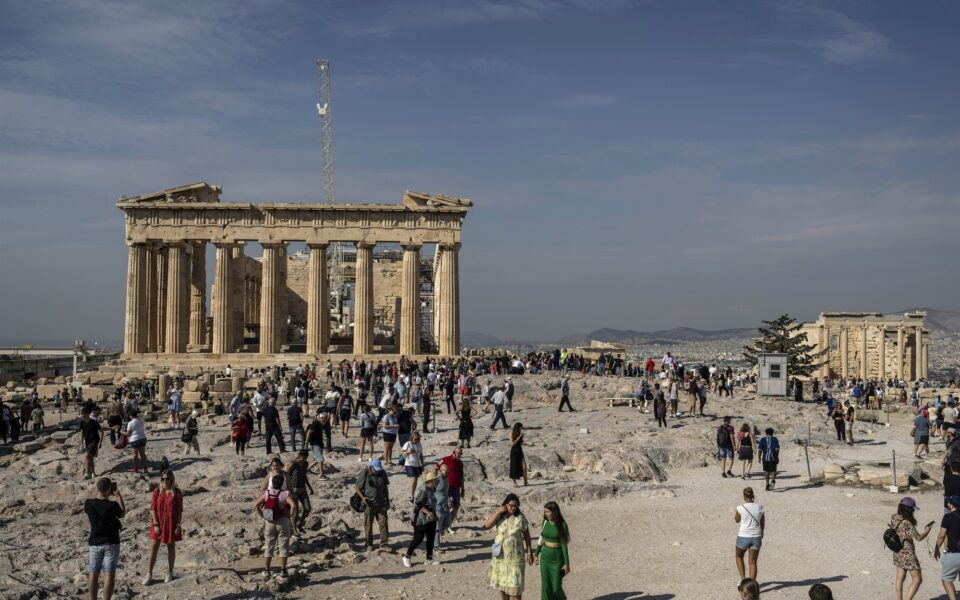Think of Greeks as a tribe, not of Greece as a civilization state

Greece has long been perceived as a civilization state. While well-meaning, this overambitious characterization based on fallacious reasoning cannot apply to the Hellenic Republic. Given how many millennia modern Athens is removed from the apex of Hellenism, imagining Greece as a civilization state implies that its best days are behind it. As a small and nationalist state with a vibrant diaspora scattered across 140 countries, Greeks should view themselves as a tribe instead. This change in thinking is crucial for building a stronger, more robust, and inclusive Greece.
Hellenism’s long list of contributions to Western civilization are undeniable: philosophy, the concept of democracy, and the bases for modern medicine, science, and geometry. And so on and so forth. Nevertheless, Greece’s demographic, economic, cultural and military weight is incomparable to that of other civilization states like France, China, Russia, Turkey, Iran and America.
Greece was colonized for centuries. Although ancient Greek philosophy thrived in the latter part of the Middle Ages, Greece itself was deprived of both the Renaissance and the Enlightenment due to Ottoman occupation. Meanwhile, Athens’ civilization-state counterparts were conquering their neighbors, expanding their empires, and imposing their rules and value systems abroad – including on Greeks themselves.
Today, Greece is a small state with colossal challenges to overcome. Having been the first to diagnose narcissism more than 2,000 years ago, it’s fitting that many Greeks maintain an “imperial” mindset due to overemphasis on the civilizational aspect of Hellenism. This often manifests in Hellenes imagining themselves as more powerful or globally significant than they are.
Unrealistic perceptions of this sort translate into unattainable expectations and unachievable goals followed by failure and disappointment. A philosophical overhaul is required to rectify this cognitive dissonance. The Hellenic Republic should borrow from the state of Israel and begin conceptualizing Greeks as members of the same tribe rather than perceiving Greece as a civilization state.
Instead of considering the Hellenic identity as an entitlement enjoyed by a privileged few, Greece should seek to incorporate Greeks everywhere under its umbrella on the basis that they are all members of the same extended family. This change in perspective will empower Hellenes to slowly but surely shed whatever “imperial” mindset remains. It might also enable Athens to finally under-promise and over-deliver in matters that aren’t related to tourism, shipping and defense.
The state of Israel was founded as a sanctuary for the Jewish people. Put simply, all Jews are considered members of the same extended family regardless of their countries of origin, divergent political affiliations and religious differences.
The Jewish diaspora, composed of creative, resilient and stateless refugees, was the linchpin of Israel’s success. Hundreds of thousands of Jews fled persecution around the world to build the state of Israel. They understood their numerical disadvantage and knew that all hands were required on deck. The freedom and prosperity enjoyed by Israelis today was acquired through the selfless sacrifices made by their courageous forebears.
Every person counts in Israel. The Jewish state is world-renowned for protecting and rescuing both diaspora Jews and Israelis from danger abroad. In Operation Ezra and Nehemiah, Israel saved Mizrahi Jews who were exiled from Iraq. In Operation Thunderbolt, a group of commandos led by Yonatan Netanyahu, brother of Israel’s Prime Minister Benjamin Netanyahu, rescued Israeli hostages at Entebbe in Uganda. In Operations Moses, Brothers and Solomon, Mossad operatives saved Ethiopian Jews fleeing famine and genocide. That’s the meaning of “extended family” to the tribe of Israel.
Like the Jewish diaspora, persecuted Anatolian and Pontic Greeks also fled or were forcibly deported from their ancestral homeland in Asia Minor during the Armenian and Greek genocides. Few refugees were welcomed with open arms. Discrimination against the descendants of Mikrasiates persists in Greece more than a century later. Even worse, Athens still doesn’t recognize the genocide perpetrated against the Greeks of Asia Minor by the Ottoman Empire, the Young Turks and the Turkish National Movement.
Many Greeks maintain an ‘imperial’ mindset due to overemphasis on the civilizational aspect of Hellenism. This often manifests in imagining themselves as more globally significant than they are
Despite this treatment, the contributions of Anatolian and Pontic Greeks to modern Greece speak for themselves. Shipping magnate Aristotle Onassis fled from Smyrna – now Izmir – at 16 years old. Nobel Prize-winning poet George Seferis was born in Vourla – now Urla. Greek staples such as Papadopoulos biscuits were also founded by entrepreneurs from Anatolia. Moreover, Greece’s integration of over 1 million refugees from Asia Minor was instrumental in modernizing the country, developing its infrastructure, and building the Greek welfare state. To characterize their contributions to Greece as timeless is an understatement.
While the Jewish state remains a haven for Jews from all around the world, Greece must do more to open its doors to diaspora Greeks. As in Israel, Greece’s population numbers around 10 million. The General Secretariat of Hellenes Abroad estimates that there are at least another 5 million diaspora Greeks residing outside of Greece and Cyprus. Athens faces a host of demographic challenges including brain drain and negative population growth. What can Greece do to attract proud Greeks from the diaspora to fill those gaps?
First, simplify the application process for diaspora Greeks to acquire citizenship. The current requirements are old-fashioned. For example, having to register your parents’ marriage to earn your spot in the family tree is simply outdated. What if your parents aren’t or weren’t married? What if you’re a second-generation member of the diaspora, and one of your parents died before they had a chance to obtain their Greek citizenship, let alone register their marriage in Greece? To make matters worse, the only words to describe dealing with Greek consulates and embassies abroad is “bureaucratic nightmare.” Fix it.
Second, institute uniform birthright trips for diaspora Greeks. This is how Jews around the world maintain their cultural and emotional connections to the state of Israel. Over the years, Athens has made progress in this regard through programs such as Heritage Greece. Nonetheless, ample room for improvement remains. Helping Greeks from abroad travel to their ancestral homeland, learn about their history, connect with their roots, and develop their sense of identity is indispensable for building a stronger Greece. Naturally, birthright trips must include exploring heritage sites of historical and cultural significance such as the Parthenon. They should also entail visits to places like the UN Buffer Zone in Cyprus, so diaspora Greeks from more privileged countries can better understand the nature of Turkish aggression in Greece’s neighborhood.
Third, continue developing academic partnerships with the rest of the free world. New agreements to expand the American College of Greece is fantastic news. However, this is just the tip of the iceberg. Athens can and must go further. Thirty million tourists visit Greece per year. More than double that many people travel to Spain and France. Nevertheless, Greece ranks nowhere near either of its counterparts when it comes to attracting foreign exchange students or in matters related to international education. Greece has the necessary components to change that.
Consider my case: I studied abroad in Australia, Chile and France. As a student at two Canadian universities, I did not have the option to participate in a student exchange, let alone obtain credit for a full semester in Greece. Unfortunately, none of my alma maters had partnerships with Greek universities. They still don’t. Rest assured, I would have seized the opportunity – even without funding. Alas, I am not the only diaspora Greek who experienced this. It is imperative that Greece continues building those connections with international universities and instituting English language programs.
Greece is a gorgeous country, rich with thousands of years of history and culture. Athens should prioritize attracting and even repatriating members of the Greek diaspora. Its comparative advantages are innumerable. Successful programs like the Greek Digital Nomad Visa attest to Greece’s magnetic appeal. The cost of living is affordable compared to many countries where diaspora Greeks reside, including in my native Canada. The weather is much better too. There is no shortage of Greeks who are willing to work, invest and even relocate to their ancestral homeland. Make it easier for them. They will come.
Greece and Israel have one more thing in common: They exist in complicated neighborhoods. In fact, the Middle East is even more dangerous than the Balkans. While Greece has one aggressive neighbor to the east, Israel is surrounded by terrorist groups, failed states, and several countries that either don’t recognize its legitimacy or actively seek to destroy it. Naturally, military service is an integral component of both the Greek and Israeli identities.
Despite decades of war and the never-ending scourge of global antisemitism, the Jewish people – a nation without a state for more than 2,000 years – transformed a desert into a garden against all odds. It only took a few decades. The Greek people can accomplish the same, and more. It all starts with thinking of Greeks as a tribe, and not of Greece as a civilization state whose best days are behind it.
George Monastiriakos is a fellow at the Geneva Center for Security Policy. You can read his published works at monastiriakos.com.





